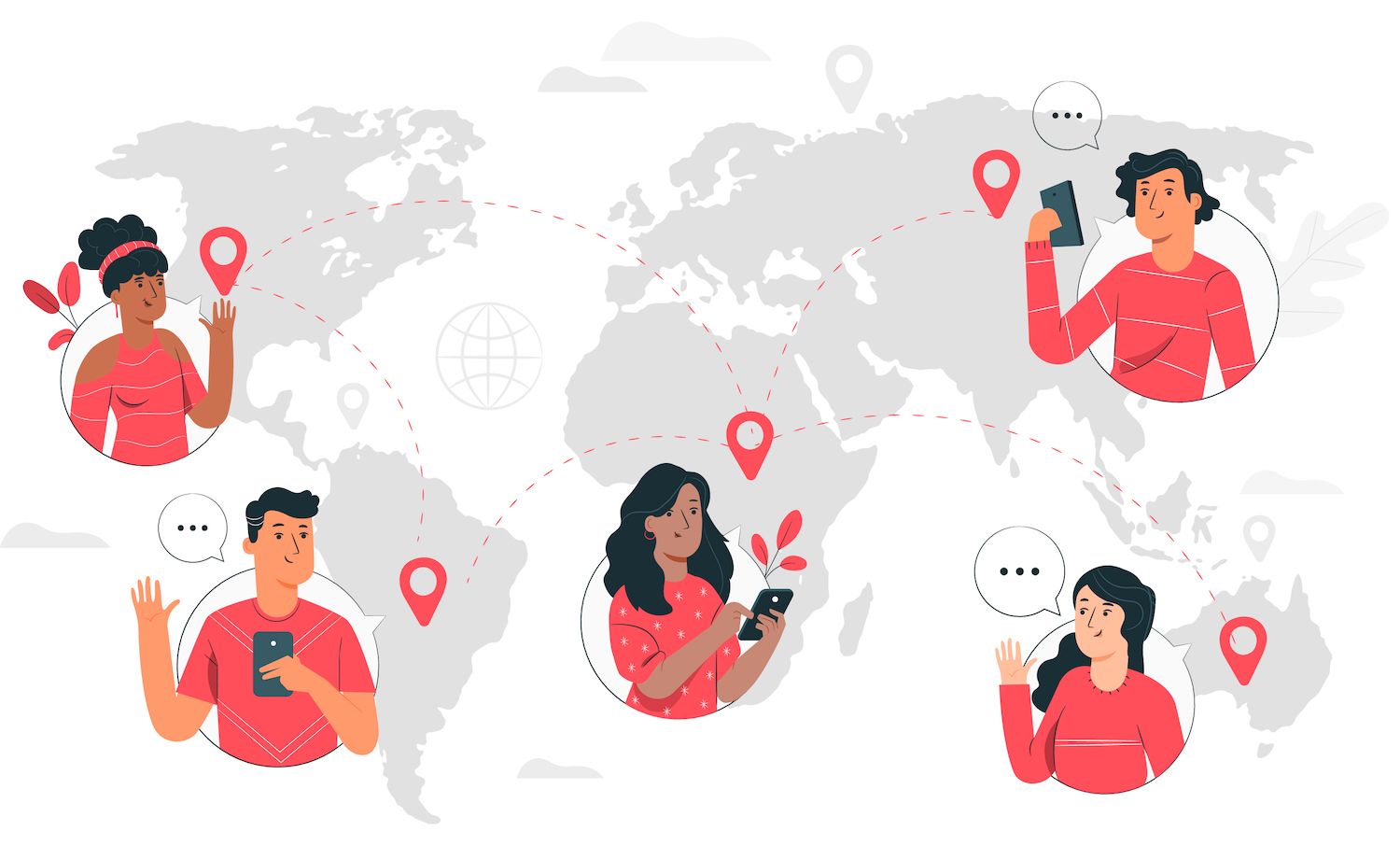Skool vs. Circle: Which is most suitable for a Community? |
In this piece, we're comparing two popular communities: Skool and Circle. If you're looking for the ideal community platform that meets your requirements, then the solution is right here.
We'll cover:
- What do Circle and Skool offer.
- Which one is more suitable for community features, classes or marketing and monetization and applications.
- Another alternative that's more rated and has more.
Test the community platform that has the most $1 million communities, absolutely free!
((toc))
What exactly are they?
Circle
In 2020, several of the employees of the online course service Teachable launched Circle. They noticed the fact that Teachable was missing an option for community participation and decided to create Circle to add it as an addition. Live learning and learning communities were on the rise, and Teachable was not positioned to provide such opportunities. Therefore, Circle was founded with a clear goal to integrate with Teachable and to add community-based learning into Teachable classes.
As time has passed, Circle has added course capability and pulled away from Teachable integrations, making it an independent, complete community-based platform. Its creators, such as Pat Flynn and Brendan Burchard have been a part of the platform. Circle is known as a clear, easy community-based platform that is organized in Spaces, with the options of adding courses or occasions.
Skool
Skool is a basic community forum created by the internet figure, Sam Ovens. Recently, the popular Alex Hormozi purchased a stake in the company, and is working hard to promote Skool through his social media channels and through paid advertising.
Skool has a feature called Discoverability to assist users in finding communities that interest them, as well as Hosts who join Skool can use it for online coaching and classes. Skool has also built an integrated calendar function to help users keep a basic scheduling. Compared to other community platforms, Skool feels pretty basic and un-technical, yet there are users who love it.
Skool vs Circle features we're comparing
If you want to know the distinction between Circle and Skool it is important to know a few things we need to study. In terms of paper, Circle and Skool have several of the same features: courses, events, and-of course, community. But these are not created in the same way.
In the next section, we'll evaluate each one on:
- Community platform
- course capabilities
- Marketing and business tools
- Apps
Skool vs Circle
Community-based platform
Skool

As a platform, Skool is a little similar to a forum from the late 90s, with a few Facebook Group characteristics. Posting is simple, and the experience for members revolves around the rolling threads feature. Members can post video, polls, GIFs as well as links and attachments. Members can make comments, like, or view videos and posts. There are also ways to categorize posts with tags to allow content to be classified into categories.
The most effective feature for building community is probably that which Skool calls "gamification:" these are leaderboards where members are awarded a an amount depending on the amount they engage-the theory is that this function increases the motivation for users to participate. Additionally, you can add unlock options and automations to produce bonus content that rewards members for engagement.

In terms of events, Skool has a scheduling capability built-in. The calendar of events is available. It allows you to add details about events to a discussion section and send reminder emails automatically or set events to repeat.

The Limitations: Skool works okay for what it is. There are however a couple of major problems you should know about before building on Skool.
- In general, the features are extremely limited when compared with a community platform Circle. We'll get to that below.
- There's not a lot of tools available to organize a larger community. If the community you're in is growing to thousands of members however, it's still restricted to the same thread of messages.
- There are no RSVPs for the events, and there is no way to host them on Skool-you require a different platform.
Circle

Circle is a community platform that can organize community content into various types of Spaces, including posts (discussion-feed style) and events, chat, and courses. Members can join relevant Spaces and pay for or block access to other Spaces too. Circle has the ability to offer Circle the ability to host more types of content that Skool in addition to more complex community discussions. And the Spaces model means that it is possible to host and sell subgroups in a community something that's almost impossible with Skool. The Spaces model lets you combine Space access, so you could create a community Space that includes activities and a course. This kind of construction provides more choices that Skool has.
Posts could be any of a variety of media (video or text, as well as polls). In contrast to Skool, Circle has livestreaming which can be used in meetings, office hours (or live courses). You can invite cohosts onstage to speak, switch between a speaker and gallery views, then download recordings after.
Circle is also home to profile pages and member directories, however (and this can be annoying), they aren't always activated by default. If they are enabled, you can find out who's a member of the community or specific Space and then start a conversation. And you can add members' tags (public or private) to sort members by their interests.

Let's discuss the concept of gamification. This was the Skool's bread and butter. However, Circle recently launched this feature and gives users the ability to earn points and gain levels and rewards with participation. They also added a leaderboard feature to show you who's participating the most. Additionally, Circle is now introducing workflows that allow you to reward members by automatically adding workflows to guide them into activities such as secret spaces or specific courses.

Which is the best?
Circle is. There's nothing to compare it with. If Skool appears a bit similar to Facebook at the time, Circle feels more like Slack now. It gives you the ability to manage complex conversations as well as create a large community including moderators and admins as you scale. With more methods of delivering the content (livestreaming) and more ways to arrange it (multiple Spaces and different types of Spaces), Circle is delivering an experience that's a decade ahead of Skool.
And Circle's use of Spaces allows you to scale community management, which Skool doesn't. Skool certainly has some big communities but the community management that spans thousands of users isn't done in the same way.
Skool 's leaderboards are awesome However, it's not certain they will result in greater involvement of the community. A few users may love the feature, particularly when they are linked to bonus content which can be not unlocked. Now the fact that Circle has them too this is not a feature that's a major selling point for Skool.
Check out our Community Name Generator
The AI engine of our platform is ready to assist you in creating a community name that feels like magic. Simply share a few sentences about what your community stands for and we'll get to work.
Go
Examples: coaching clients, meditation novices, vegan chefs, dog lovers, aspiring entrepreneurs, etc.
Get Ideas
The names generated by Mighty Co-Host(tm) are used as examples only and can be utilized by other companies or under third-party rights. For more information, check our Terms.
Courses
Skool

Skool's courses carry through the theme word of the community platform, and the term"basics" means "basic."
The good news is that it is possible to create course sections and sub-lessons. Lessons can be made up of videos or text (these aren't natively hosted but you can upload them from Vimeo and YouTube). The lessons can include a discussion option or you can switch between a video transcript or drip content.

Editing courses isn't easy as well. Prior to recently, courses were modified within the "settings" tab-Skool changed this. However, editing continues to happen at the bottom of the backend, rather than a specific learning Space.
Once a course is running, it's hosted on a "Classroom" tab in Skool. This is a good thing. And the courses are easy-to-navigate for learners and pretty intuitive.
Another thing. Skool doesn't have the option to teach live. The hosting of a live class or gathering would require third-party software.
Circle

In Circle classes are delivered via a space for courses. Since each Space is paywalled, or bundle, it also is the method of delivering courses. Building a course on Circle is fairly easy. You build off of the outline using drag-and-drop blocks. It's similar to a classic LMS. Lessons are made from audio, video, text, or downloads You can also preview them prior to starting. But remember, course material counts towards the overall capacity of the plan.
Circle also has live courses as well, something that Skool doesn't. Live tools to conduct live classes, or host meetings, office hours as well as other experience learning opportunities.

Which is the better option?
In the end, Circle wins out here. The synchronous platform it offers is just as good or even better than Skool's offering, and it has more tools to build courses. However, you are able to teach live natively-which you can't on Skool.

Marketing & Monetization
Skool
Although it isn't the best course and community service, Skool has one main advantage. The discovery approach. Contrary to Circle users, visitors to Skool are directed to a discovery section (a bit like Substack's homepage). This shows you a ton of communities and can help members of news groups find your profile. However, be aware that it's probably not enough in it's own to make a difference in. There are a lot of Skool communities, so you're not likely to discover yours (although having a niche that is strong or long-tail keyword might help).
For the monetization aspect, Skool also has an affiliate program too however it's not an Skool Affiliate Program. It's like this: If you introduce the community's paid members to Skool when that individual establishes their own community, you receive 40 percent of their monthly payments.
In the moment of writing this article, Skool just added its own payment option. All prices on Skool are charged in USD, and if you don't live in the US your payment will be in your local currency.
Skool does not have any separate landing pages. People can see the option to join a group or purchase a course and buy from the button. Skool does not have an email address, as well.
Also, Skool doesn't currently have any way to add your personal branding to the Skool community, apart from a logo image for the header.
Circle
You can create a true affiliate program with Circle that is, you could pay others to help sell and promote your community.
Circle offers more branding options than Skool too, with white and dark mode, as well as tools for customizing the look and feel of your community. You can add a custom domain name to Circle also. And for even more customization, you can add in diverse code fragments from the Circle community. It could be styling using the CSS feature, or coded integrations like Google Analytics tracking code.
Integrations Circle has thousands of integrations as well-mixed between native integrations as well as Zapier. Native integrations comprise Memberstack, WordPress, Loom, Stripe, and Vimeo.

Which is better?
Skool's Discover section looks cool, but there's no evidence this will result in the long-term growth of your community. There's still a lot of Skool community members to be recognized. Circle's deal means less front-end visibility, but potentially fewer distracting factors.
If branding matters to you, remember that you can't apply your branding directly to Skool. If you are an independent creator of content, this can be a hassle. For established brands and creators, this is probably an issue. All of the activities occur within Skool's community and creates their reputation. Circle can be used to build a brand that reflect your. It also Circle has way more integrations for building out a full tech stack.
Cost Comparative
Skool
- $99/month +2.9 percent transaction cost (one only)
Circle
- $49/month plus 4% transaction fees Basic plan (Community Only)
- $99/month + 2% fees - Pro Plan (add courses, livestreaming and branding)
- $219/mo + 1% fees Business Plan (add workflows and custom fields, as well as white-labels for emails, as well as AI aid)
- $399/mo + .5% fees - Enterprise (add SSO, and analytics, 10 admin as well as 100 mods)
Apps
Skool
Skool is an application for any device, which replicates many aspects of the internet-based web application. As as of this writing, it's scored 3.6 stars on the Google Play Store and 3.8 stars on the App Store. It doesn't have the option of an app with a white label.

Circle
Circle provides apps that are much better-rated than the Skool apps (4.5 stars for Google Play and 4.9 on the App Store) which makes its user experience on mobile much more enjoyable. But Circle also has the option to add branded apps to the community, allowing you to share your apps with Apple and Android.

Which is the best?
In the end, Circle wins here too. Their apps perform better and match the Community Design(tm) as well as you can choose to switch onto the apps that are branded.
Skool Vs Circle: Which one is the best?
Circle is. It is the winner in every category which we examined here:
- A more powerful community platform with Spaces for organizing large discussions, livestreaming, and more overall capabilities.
- Both live and asynchronous courses.
- The option to add your own branding and build the experience of a course or community that is professional.
- Great apps for any gadget and brand-name applications if you'd like.
And-depending on your plan-Circle offers its platform at a comparable (or even lower) price to Skool. Why would you spend more on Skool even though it offers just a small fraction of its capacity of the community?
But there's another option...
G2's most highly rated community-based platform
While Circle rates better than Skool, there is another community-based platform that's more highly rated over Circle with a price that is comparable.
is the most popular community platform on G2. It's the home of more than $1 million communities that are more than any other, and it's a trusted partner for designers and brands like Tony Robbins, Mel Robbins, Jim Kwik, Marie Forleo, TED, and Matthew Hussey.
Here's what Mighty compares to both Circle and Skool.
Better community-building
Circle has Spaces available, which assist in forming a more unified community. However, you must choose from the different types of Spaces that you would like. Therefore, it isn't possible to place a course, an event, and a community in the same place.
Mighty takes Spaces one step further.
On Mighty, Spaces are container which can house any feature like a Table of Contents for a course and Activity Feeds, Chat, members, recurring events One-time Events, a Page (an article), or Highlighted Hashtags.
So, what does this mean?
That means that, if the Circle community needs events, courses, and community in different Spaces, Mighty lets you build using the features you want (turning off features you do not need).

Software designed for engagement
It's not just about providing content. Our data shows with 93% accuracy the communities that will be successful or not. It all boils down to the degree that members communicate with each other.
Our software can do exactly that. People Explorer is a tool that People Explorer helps your members discover people with similar interests, similar backgrounds, and even geographic proximity. (Mighty Co-Host(tm) will aid them with creating profiles as well. )
The AI engine can tell you the things you share as well as start a conversation. With smart tools like that of the Infinite Question Engine to automate discussions (generating and posting approved questions even if you're offline) And you've got a platform that's constantly building engagement.

AI to make admin simpler
Mighty is developing AI tools to make your admin easier.
- Create a community instantly in seconds. Just add a few lines in Mighty Co-Host(tm) then it'll create a Big Purpose, basic brand image, and a first Space. (Try for free)
- Get writing prompts and improvements, discussion questions as well as instant course outline and hashtag suggestions to improve engagement and creation.
- "Activity Assist" will show you users who aren't active, and immediately confirm their presence (AI may even provide the discussion starter).
These are examples of functions that community platforms don't have yet.

Then

It gives you the ability to create any type of community that you like and monetize it in 135 distinct currencies, connect ConvertKit or include more than 22,000 embeds for integration, and build under your own brand. The app store has great applications that work on every device and it has developed more than 400 branded apps for many of the top brands and creators.
Start today! You may be inviting your first customers in a matter of minutes, and there's no credit card required to try.
